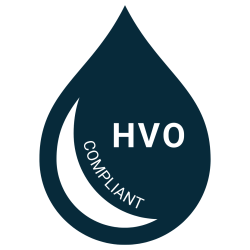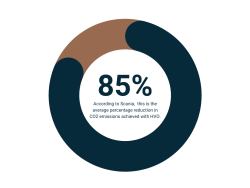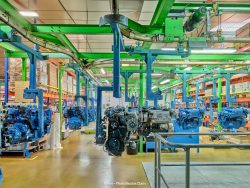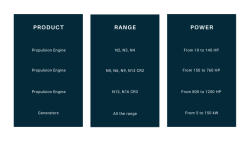HVO – The innovative 100% biofuel for the marine sector
The transition to more environmentally-friendly practices is becoming ever more significant, on an individual, collective, political and economic level. Marine industries, including Nanni, find themselves inevitably at the heart of these concerns, subject to standards decreed by entities such as the European Union and international agreements, including the one signed in Paris in 2015 by 55 countries.
In this restrictive environmental context, the quest for renewable energy sources becomes crucial to achieving the global goal of reducing fossil fuel consumption worldwide. HVO (Hydrotreated Vegetable Oil) is emerging as one of the most promising fuels for meeting these requirements. Developed from sustainable vegetable oils, vegetable or residual raw materials, or even residues such as cooking fats and oils, this promising alternative is positioned as a solution for the future of the marine industry.
Here, we take a closer look at what HVO is, where it comes from, and how it could become a sustainable alternative in the boating world, especially for committed players like Nanni.
What is HVO ?

This is a fuel based on hydrogenated vegetable oil. It is produced from 100% renewable components such as oils, waste and vegetable raw materials (rapeseed, palm, soya…), which are transformed by a process called hydrogenation to add hydrogen to the mixture and obtain synthetic paraffinic diesel without sophisticated additives.
The result is a more sustainable fuel, certified under the European Union’s Renewable Energies Directive. As part of the biofuels regulation, the European legislator has introduced strict criteria on environmental aspects such as carbon footprint, to name but one, as well as standards such as EN 15940 for paraffinic diesel of this type.
A major impact on the environment and health
Why does this fuel seem to be the one that will turn the green energy’s tide?
There are a number of reasons for the adoption of hydrotreated vegetable oil (HVO) in the marine world, offering both amateurs and professionals an attractive ecological alternative. As a replacement for conventional diesel, HVO has a much lower carbon footprint, making a considerable contribution to reducing greenhouse gas emissions. Its compatibility with existing diesel engines, without the need for costly modifications, makes it a pragmatic choice for sailors.
Beyond reducing emissions, sustainable practices in the maritime sector involve careful resource management, waste minimization, and the adoption of environmentally-friendly technologies. By opting for alternatives such as HVO, the marine industry is actively engaged in a fundamental transformation of its production methods, an essential change given the status of shipping as the principal means of exchange, and unfortunately, one of the most polluting.
A scientific reminder clarifies the situation: burning traditional diesel releases carbon dioxide into the atmosphere, contributing to climate change. On the other hand, the use of HVO considerably reduces these emissions thanks to its production process and chemical composition, making it a powerful means of preventing climate change. Opting for HVO is not simply a more sustainable choice; it’s a concrete action to actively reduce our environmental footprint on the oceans we so love to explore.
What about our health?
Protecting air quality in maritime areas represents a major challenge, highlighted by the World Health Organization (WHO), which estimates that some 7 million premature deaths are linked to air pollution every year. By reducing its emissions, hydrotreated vegetable oil (HVO) plays a strategic role in reducing air pollution, particularly in port areas where ships dock and stay.
Among the most polluting substances, nitrogen oxides (NOx), sulfur oxides (SOx) and particulates top the list. Here, HVO stands out as a long-lasting alternative to traditional diesel, enabling boats to significantly reduce their emissions of these pollutants.
Highlighting the tangible impact on air quality, a study in the Journal of the Air & Waste Management Association (JA&WMA) highlights that HVO can deliver a consequent reduction in NOx emissions, of up to 25% compared with diesel. The emergence of the HVO solution dates back to 2009, and has since gained momentum with the support of heavyweights in the hydrocarbon market.
This growing choice in favor of HVO underlines its essential role in transforming the energy landscape, offering a sustainable, high-performance response to the air quality challenges facing the marine industry.
A challenging energy transition
HVO’s core appeal lies in its versatility, positioning it as an eco-efficient alternative for a wide variety of boats. Even the fishing industry, a major player in coastal activities, is embracing HVO to ensure sustainable fishing without compromising the marine ecosystems’ health.
However, a major challenge persists in the widespread adoption of HVO in the marine sector: its availability and the establishment of an efficient supply chain in ports worldwide. As demand for sustainable fuels grows, the uneven accessibility of HVO in ports creates a pressing need for collaboration between fuel suppliers, port authorities and the marine industry. Overcoming this challenge becomes crucial to ensure a smooth transition and availability of HVO for boats in various ports around the world, supporting the growing movement towards cleaner alternatives.
Another obstacle ahead is the initial cost of adopting HVO. Although the long-term economic benefits are undeniable, the initial investment can be challenging. Adapting the existing infrastructure for HVO storage, handling and distribution requires a strategic approach, prompting intensive collaboration stimulated by government policies and industry partnerships. By overcoming these obstacles, the marine industry can make its commitment to more sustainable practices a reality, sailing towards a future, where HVO becomes the norm for all types of boats
HVO: a solution embraced by Nanni
The ecological scope of HVO can be seen in various areas of the maritime sector. On inland waterways, where shipping routes wind through environmentally sensitive areas, HVO provides a solution for preserving aquatic ecosystems. Passenger transport also benefits from its advantages, as the clean combustion of HVO contributes to better air quality on board, ensuring a healthier journey for passengers.
This application can be seen in India, with the Cochin Shipyard Limited using Nanni generators. This major player in India’s maritime landscape has set a remarkable precedent by adopting HVO for its river cabs. Recognizing the importance of sustainable practices, CSL uses this fuel as part of its commitment to reducing emissions and fostering a greener maritime environment. By choosing this solution, CSL not only contributes to environmental conservation, but also sets an example for other shipyards and fleets around the world.
The benefits of HVO as an eco-aware marine fuel are a source of progress for Nanni: a major reduction in greenhouse gas emissions, improved air quality in port areas and fragile spaces… Hydrogenated vegetable oils provide concrete solutions to the harmful effects of fossil fuels. From merchant ships to fishing boats, HVO is a versatile solution. Its compatibility, efficiency and positive economic impact make it an essential ally in the pursuit of greater respect for the environment.
Sourcing HVO, and finding out more about it, is just as simple: alternative fuel distributors, port authorities, marine associations and more.
One question remains:
Which Nanni motors are compatible with HVO?
Nanni’s HVO-compliant range is available for N2, N3 and N4 propulsion engines (from 10 to 140 hp) as well as for Q500, Q1100, Q1500, Q2400 and Q3300 generator sets (from 5 to 38 KwA).
As the adoption of HVO grows, Nanni positions itself as a leader committed to guiding the marine power industry towards a more responsible future. The story of HVO in the marine industry unfolds like a tale of promise and progress, where environmental responsibility meets economic prudence.
This horizon enables us to sail collectively towards a future where the seas are better preserved and the air is cleaner. With Nanni, let’s pave the way for innovative, cleaner motorization.




